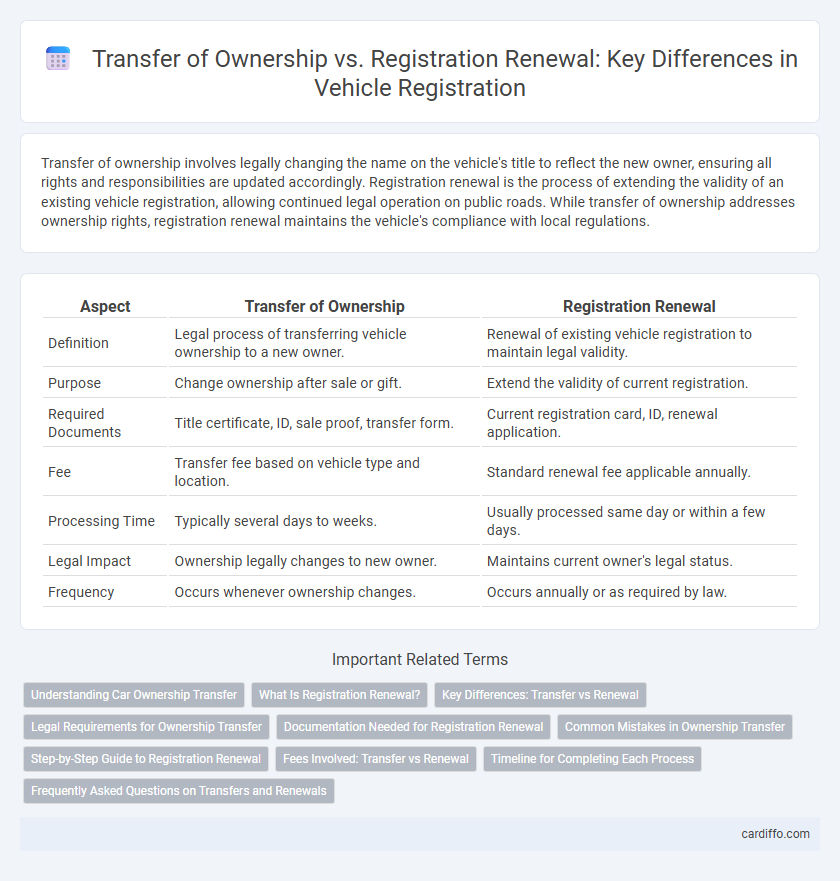Transfer of ownership involves legally changing the name on the vehicle's title to reflect the new owner, ensuring all rights and responsibilities are updated accordingly. Registration renewal is the process of extending the validity of an existing vehicle registration, allowing continued legal operation on public roads. While transfer of ownership addresses ownership rights, registration renewal maintains the vehicle's compliance with local regulations.
Table of Comparison
| Aspect | Transfer of Ownership | Registration Renewal |
|---|---|---|
| Definition | Legal process of transferring vehicle ownership to a new owner. | Renewal of existing vehicle registration to maintain legal validity. |
| Purpose | Change ownership after sale or gift. | Extend the validity of current registration. |
| Required Documents | Title certificate, ID, sale proof, transfer form. | Current registration card, ID, renewal application. |
| Fee | Transfer fee based on vehicle type and location. | Standard renewal fee applicable annually. |
| Processing Time | Typically several days to weeks. | Usually processed same day or within a few days. |
| Legal Impact | Ownership legally changes to new owner. | Maintains current owner's legal status. |
| Frequency | Occurs whenever ownership changes. | Occurs annually or as required by law. |
Understanding Car Ownership Transfer
Car ownership transfer involves legally changing the registered owner's name on the vehicle title, ensuring liability and legal responsibilities shift to the new owner. Registration renewal updates the vehicle's registration status annually without altering ownership details, confirming compliance with local motor vehicle regulations. Understanding the distinction between these processes helps avoid legal complications and ensures accurate vehicle records.
What Is Registration Renewal?
Registration renewal is the process of extending the validity of an existing vehicle registration by updating necessary documentation and paying required fees before the current registration expires. It ensures that the vehicle remains legally registered for use on public roads and typically includes a validity period of one year or more, depending on local regulations. Unlike transfer of ownership, which changes the registered owner, registration renewal maintains the same ownership but renews the vehicle's legal authorization to operate.
Key Differences: Transfer vs Renewal
Transfer of ownership involves legally changing the registered owner of a vehicle or property, requiring documentation such as a title transfer form, proof of sale, and identification verification. Registration renewal updates the current owner's information to maintain valid registration status, typically necessitating payment of renewal fees and proof of insurance. Key differences include the transfer process altering ownership records, while renewal simply extends the registration validity without changing ownership details.
Legal Requirements for Ownership Transfer
Legal requirements for ownership transfer mandate submitting a valid title deed, proof of identity, and a completed transfer application form to the relevant motor vehicle department. Transfer of ownership typically requires payment of applicable fees and may involve a mandatory vehicle inspection or emissions test. Registration renewal only updates the vehicle's registration status without changing ownership, whereas ownership transfer legally assigns the vehicle to a new owner under the jurisdiction's specific regulations.
Documentation Needed for Registration Renewal
Documentation needed for registration renewal typically includes the current registration certificate, proof of insurance, and a valid identification card. Unlike transfer of ownership, registration renewal does not require a bill of sale, title transfer documents, or emissions test certificates. Ensuring all necessary paperwork is up to date accelerates the renewal process and maintains vehicle compliance with state regulations.
Common Mistakes in Ownership Transfer
Common mistakes in ownership transfer include failing to submit the required documents on time, leading to penalties or legal complications. Many owners confuse transfer of ownership with registration renewal, which results in incomplete transactions and continued liability under the previous owner's name. Ensuring accurate and timely transfer of ownership paperwork prevents fraud, disputes, and unnecessary fines.
Step-by-Step Guide to Registration Renewal
Renewal of vehicle registration requires submitting a renewal application through the DMV platform, providing proof of insurance, passing any required emissions or safety inspections, and paying the applicable renewal fees. The process differs from transfer of ownership, which involves ownership documents, a bill of sale, and title transfer paperwork. Completing registration renewal promptly ensures legal vehicle operation and avoids penalties for expired registrations.
Fees Involved: Transfer vs Renewal
Transfer of ownership fees typically exceed those for registration renewal due to title reassignment and administrative processing costs. Renewal fees mainly cover vehicle inspection, road taxes, and standard administrative charges, which are generally lower and recurring annually. Comparing both, transfer fees represent a one-time, higher expense, while renewal fees are periodic and relatively minimal.
Timeline for Completing Each Process
Transfer of ownership typically requires completion within 30 days from the date of sale to avoid penalties, involving submission of the title deed, proof of sale, and payment of transfer fees. Registration renewal must be completed annually before the expiration date, usually within a 60-day window to ensure continuous legal vehicle operation, during which proof of insurance and payment of renewal fees are mandatory. Delays in either process can result in fines, suspension of registration, or legal complications affecting vehicle use.
Frequently Asked Questions on Transfers and Renewals
Transfer of ownership involves legally changing the vehicle's title to a new owner, while registration renewal ensures the current owner's vehicle remains legally registered for road use. Common FAQs address required documents for ownership transfer, deadlines for renewal, fees involved, and the consequences of failing to update ownership or renew registration on time. Understanding these differences helps avoid penalties and ensures compliance with DMV regulations.
Transfer of Ownership vs Registration Renewal Infographic

 cardiffo.com
cardiffo.com